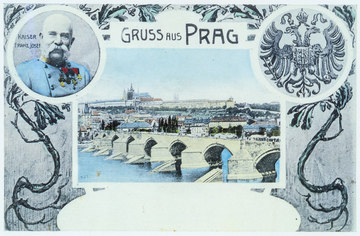The demand for autonomy for Bohemia was a core issue in the national movement, which by now had become a mass phenomenon. From the Czech perspective Bohemia was seen as a political nation with an emphatically Czech character – consciously suppressing the fact that this contradicted the ethnic concept of the nation: because “Bohemians” no longer existed; national agitation now applied only to Czechs and Germans.
“We were here before Austria and we shall also be here after Austria.”
This statement from the doyen of the Czech National Movement, František Palacký, demonstrates the disappointment after the Austro-Hungarian Compromise of 1867.
This led to a hardening of the fronts between the two linguistic groups in the country. The Czech demand for Bohemia’s autonomy was rejected by the Bohemian Germans, who would have then been put in the position of an ethnic minority. The representatives of the centralist German-liberal camp forming the Government spoke out for the retention of the status quo, according to which the Czechs would be granted national rights on the local level, but the Bohemian lands would still be ruled from Vienna. The demands of the German nationals were more radical; they wanted a partition of Bohemia according to ethnic principles and planned annexation of the German-speaking parts of the country to the German-speaking Danube and Alpine lands and Germany. Thus was in turn rejected by the Czechs, who insisted upon the historical borders and saw themselves as the majority population and bearers of Bohemian statehood.
The controversy surrounding the Bohemian question subsequently became the determinant theme in Cisleithania. The Czech members in the Imperial Council hindered cooperation with the Government through their obstruction politics. Participation in political affairs in the Imperial Council was spent in reading protest notes and the subsequent demonstrative withdrawal from the sessions, which in the long run led to an isolation of the Czechs in the Imperial Council.
After the collapse of the liberal Government in 1871, Hohenwarth’s more intensively federalist-oriented cabinet attempted a détente with the Czechs. This led to secret negotiations with the top representatives of the Czech political scene. The outcome materialised in the Bohemian Fundamental Articles, which manifested a distinctly positive approach to Czech demands. It contained acknowledgement of Bohemian statehood within its historical borders and widespread equality of Czechs with the Germans in the Bohemian lands. The outcome would have been a kind of “Compromise”.
However, this Compromise foundered on the opposition of the Germans not only in the Bohemian lands, but also in the whole of Cisleithania. Massive solidarity actions erupted in all German-speaking areas of Austria. Even the Magyars spoke emphatically against the dilution of Dualism. After this repeated attempt to achieve a Bohemian Compromise had foundered, for the Czechs it meant the end of collaboration with the empire of Austria.
Translation: Abigail Prohaska
Hoensch, Jörg K.: Geschichte Böhmens. Von der slavischen Landnahme bis ins 20. Jahrhundert, München 1987
Kořalka, Jiří/Crampton, Richard J.: Die Tschechen, in: Wandruszka, Adam/Urbanitsch, Peter (Hrsg.): Die Habsburgermonarchie 1848–1918, Band III: Die Völker des Reiches, Wien 1980, Teilband 1, 489–521
Kořalka, Jiří: Tschechen im Habsburgerreich und in Europa 1815 bis 1914. Sozialgeschichtliche Zusammenhänge der neuzeitlichen Nationsbildung und der Nationalitätenfrage in den böhmischen Ländern (Schriftenreihe des Österreichischen Ost- und Südosteuropa-Instituts 18), Wien 1991
Křen, Jan: Dvě století střední Evropy [Zwei Jahrhunderte Mitteleuropas], Praha 2005
Rumpler, Helmut: Eine Chance für Mitteleuropa. Bürgerliche Emanzipation und Staatsverfall in der Habsburgermonarchie [Österreichische Geschichte 1804–1914, hrsg. von Herwig Wolfram], Wien 2005
-
Chapters
- The Czechs in the Habsburg Monarchy
- How Czechs evolved from Bohemians
- The Revivalists of the Nation
- Separate Ways: The Effects of the 1848 Revolution in Bohemia
- The Vectors of Czech National Identity
- The Call for Autonomy
- Hardening of the Fronts: The Czech Demand for the Bohemian Compromise
- Attempts at Solutions and Escalation: Language Conflict and Badeni Crisis
- The Czechs’ Spectrum of Parties
- The Lack of Alternatives: the Attitude of the Czechs towards the Habsburg Monarchy at the Outbreak of the War





